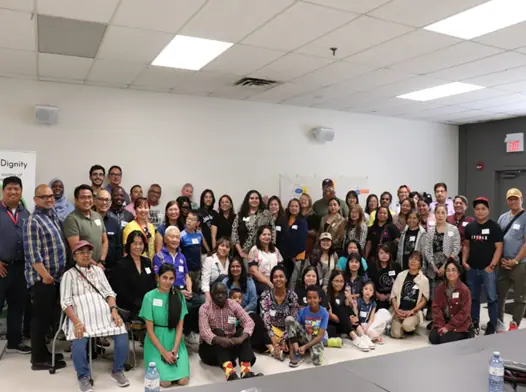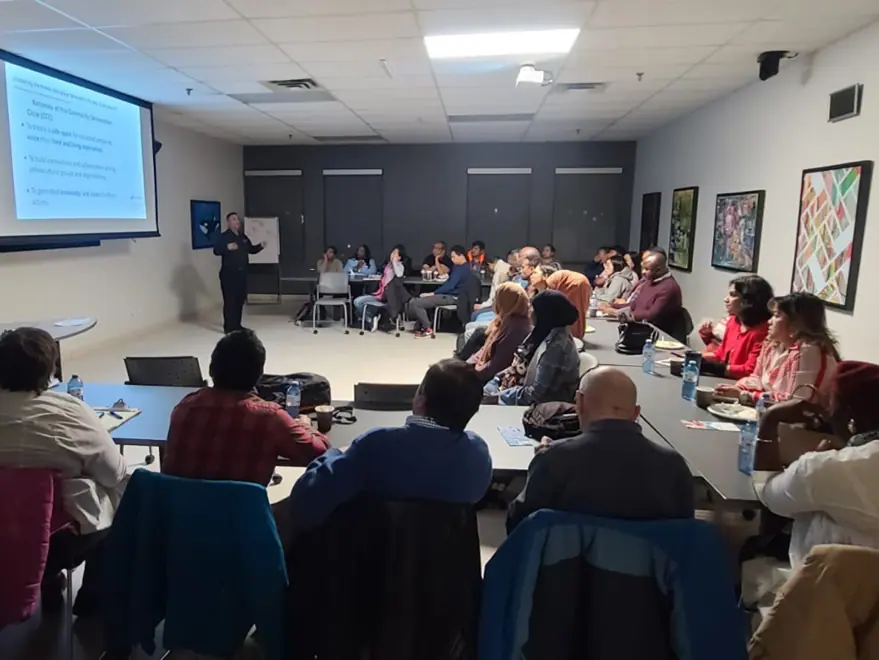Building Worker Power Through Collaboration with Community Organizations
Editor’s Note: This blog post is reposted from one of our funders: WES Mariam Assefa Fund, highlighting the impactful work we’re doing together to advocate for workers’ rights. Thank you to the WES Mariam Assefa Fund for championing our shared vision and thank you to Olivia Fox, Program Interan at the WES Mariam Assefa Fund for writing this article. Our partnership is making a meaningful difference as we continue addressing challenges faced by workers. The original article can be found here

Photo: ActionDignity Celebrating Canada Labour Day
When the COVID-19 pandemic hit in 2020, racialized essential workers at the Cargill meatpacking plant in Alberta faced a disproportionately high risk of contracting the virus. The existing exploitative and dangerous work conditions in the meatpacking sector, such as crowded industrial spaces and weak worker protections, were magnified by the pandemic. The meatpacking industry relies heavily on racialized, immigrant, migrant, and refugee workers, all of whom bore the brunt of this danger.
ActionDignity and the WES Mariam Assefa Fund
ActionDignity, a community-based organization in Calgary, recognized the need to support these workers, increase their understanding of rights, and empower them to advocate for these rights in the workplace. In 2020, the WES Mariam Assefa Fund awarded ActionDignity a grant to support its Believe in the Rights and Value of Essential (BRAVE) Workers Program.
During the following two years, ActionDignity built worker power by collaborating with community partners and developing a workers’ rights kit which has been translated into 12 languages, as well as a report on their research findings, “No Safe Place.” Workers were encouraged to share their experiences through storytelling sessions and meetings. Insights gained from these sessions were used to produce issue briefs to work toward policy dialogue. In 2021, ActionDignity facilitated translation in a collective bargaining agreement to ensure that all workers could participate in the bargaining process. Workers were able to successfully bargain for a new agreement with higher compensation which included back pay, signing bonuses, a 21 percent salary increase, and extended health benefits.
In 2023, the Mariam Assefa Fund renewed its partnership with ActionDignity to expand the organization’s efforts to advance systems change around decent work for racialized essential workers.
Empowering Essential Workers
According to the Strategic Lead for Workers’ Rights at ActionDignity, Paban Adhikary, the main challenge racialized essential workers face is precarious and exploitative working conditions. One systemic challenge ActionDignity is addressing is workers’ reluctance to speak up about issues with working conditions. There are various reasons for this reluctance, including fear of job loss or deportation. Other factors such as language barriers, information accessibility, or knowledge barriers also make it difficult for workers to voice their concerns.
ActionDignity has developed three areas of focus to address these challenges: empowering racialized essential workers through legal rights education, involving workers in the process of building community and advocacy networks, and supporting Racialized Ethnocultural Community Organizations (RECOs).
“Educational sessions, including policy dialogues and community conversation circles, have empowered over 300 leaders and workers from 33 diverse communities, helping them understand their rights and feel more secure in voicing concerns about workplace issues,” says Adhikary.
ActionDignity has also been conducting systems mapping to better understand the systemic challenges faced by racialized essential workers. Based on insights gleaned from community members throughout this process, in June 2024 the organization launched Policy Dialogues, wherein more than 153 community members described pressures they faced related to workers’ rights and other ActionDignity areas of focus. The top priorities identified from these sessions were presented at a discernment assembly organized by the Calgary Alliance for Common Good in September 2024. The attendees voted to launch a two-year advocacy campaign to address the issue of good jobs. A Research Action Team has formed and will convene to explore these issues further and plan the necessary actions.

Photo: Community Conversation Circle on Uncovering Workplace Harassment – Sexual Harassment
Role of Racialized Ethnocultural Community Organizations
Racialized Ethnocultural Community Organizations (RECOs) play an integral role in addressing systemic inequalities at both community and policy levels. These organizations collaborate with ActionDignity to develop programs and resources tailored to the needs of specific communities. RECOs are uniquely positioned as they best understand how to support their communities and how to effectively distribute information. They are also able to advocate for policy changes that reflect the priorities of their communities. ActionDignity supports RECOs through training, tools for capacity building, and financial support. Through their work with ActionDignity, RECOs are able to expand their impact and better meet the needs of racialized workers.
Currently, ActionDignity collaborates with 173 organizations that advocate for their communities both in discussions with ActionDignity and in broader policy dialogues.
“This collaboration not only enhances the program’s impact but also creates a strong network of informed advocates who can sustain and expand these efforts within their communities,” Adhikary says.
For example, the Workers Resource Center (WRC) worked with ActionDignity to expand its outreach to racialized communities by hiring a racialized caseworker and opening an office in Genesis Center, a heavily racialized community area. Initially, racialized essential workers perceived the WRC as working primarily to serve White individuals. The new office location and expanded outreach shifted workers’ perceptions. The WRC and ActionDignity continue to organize events, teach workers about their rights, and host community conversations on workplace sexual harassment.
ActionDignity’s Ambitions For Workers
ActionDignity hopes to facilitate increased awareness and knowledge among workers of their rights and processes for addressing grievances. Through resource kits, the organization is making information more accessible for workers. Additionally, it hopes to enhance workers’ confidence in voicing concerns and reduce fear of retaliation, by creating a supportive environment and clear channels for complaints. Finally, ActionDignity is strengthening community support and advocacy systems through policy dialogues with the community and with leaders from diverse racialized ethnocultural communities.
“The community pressures [revealed] from policy dialogues and story from community conversation circles build a better understanding of systemic issues and areas needing improvement, leading to informed policy changes and enhancing the responsiveness of systems designed to protect racialized workers,” Adhikary says.
Reflecting On Our Partnership
The WES Mariam Assefa Fund is honoured to work with ActionDignity as a grantee partner. The organization’s crucial efforts are improving working conditions for racialized essential workers. ActionDignity’s work is vital, as workers’ rights issues are pervasive in many sectors across Canada. Its approach to dismantling barriers for racialized essential workers at the grassroots level while advocating for policy change is an innovative way to work toward systemic change.
During my time as an intern with the Mariam Assefa Fund, I have had the opportunity to learn about ActionDignity’s work and interact directly with its team. This has helped me learn about the complex issues facing racialized essential workers in Calgary. It has also helped me appreciate the importance of meaningful engagement with community organizations in building sustainable solutions. I am inspired by the ways that ActionDignity is improving working conditions for racialized essential workers in a way that centers the importance of personal and community-specific support and the role this plays in larger-scale advocacy work.
BACK TO BLOG


